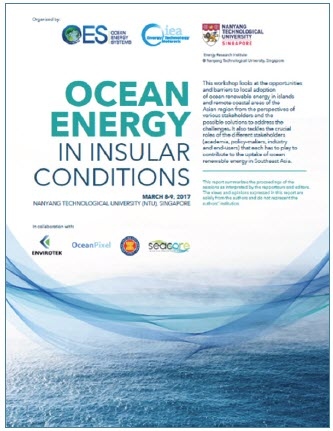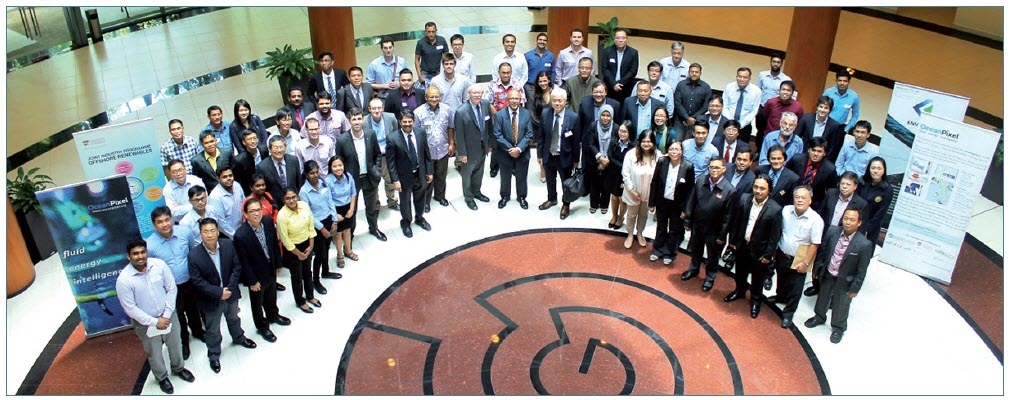Proposals Discussed by the ExCo
|
PROPOSAL SUBMITTED BY Ocean energy is relatively new in comparison to other renewable energy sources in Southeast Asia. However, ocean energy activities in the region’s water have been gradually increasing in the last decade. Southeast Asian countries is faced with the challenge of providing cleaner energy technologies for the increasing energy demand. On the other hand, in Southeast Asia, one fifth of its population remains to be not connected to the grid and most of these islands and remote coastal areas are heavily dependent to diesel as their source of energy. Generally, the island and remote coastal communities still have a lack of knowledge in ocean energy resources and technologies to utilize the resource. There is a need for research to identify ocean energy resources and their feasible technologies for island electrification. Therefore, a first workshop on “Ocean Energy in Islandic Conditions” has been organised on 8-9 March 2017, at the Nanyang Technological University (NTU), in Singapore, to facilitate the discussions of the various stakeholders of the ocean renewable energy field specifically those situated in islands or remote coastal areas of the region. The workshop looked at the opportunities and barriers to local adoption of ocean renewable energy in islands and remote coastal areas of the Asian region from the perspectives of various stakeholders and the possible solutions to address the challenges. It also discussed the crucial roles of the different stakeholders (academia, policy-makers, industry and end-users) that each has to play to contribute to the uptake of ocean renewable energy in Southeast Asia. |
 |
The results of the workshop were published in the report “Ocean Energy in Insular Conditions”.
A second workshop with more international focus will be organised in 2018 to discuss the approach for a new OES Task under this topic.

OCEAN ENERGY JOBS CREATION
PROPOSAL SUBMITTED BY
Yann-Hervé De Roeck, FRANCE
For decision makers, the assessment of the number of jobs related to the development of the Ocean Energy sector is of utmost importance. Figures have been advanced in various roadmaps targeting horizons at 2025, 2030 and even 2050, but in the time since their calculation, not only have numerous devices been designed and tested, but some pilot farms have also been implemented. It is time to assess a first count of the total number of jobs directly related to the sector.
The proposed project aims to provide both a working methodology and actual figures of ocean energy jobs creation, with an explanation of the accuracy associated with the results. Planned task includes the analysis, validation and the potential improvement of field data collection methods; the state of the art of available models and assessment of their respective limitations; field data collection and run of the model with input parameters collected and tuned for each participating country.
A first workshop will be organized in 2018 to discuss the approach for this study.
OPEN WATER TESTING
PROPOSAL SUBMITTED BY
European Marine Energy Centre, UK
There are number of marine energy open water test sites currently in operation, construction or planned for development. In 2012, a workshop in Dublin launched OES Task 5 which brought together open-water test site operators and device developers to exchange information and experience on all aspects of planning, development, operation, and usage of open-water test facilities. The aim of this workshop was to identify improvements in the capabilities of these facilities for the mutual benefit of the ocean energy industry. In late 2013, the European Marine Energy Centre (EMEC) invited all existing and planned wave and tidal energy test sites worldwide to attend a symposium in Orkney, Scotland. Participants at this event represented test sites from around the globe and collaborative research opportunities worldwide were discussed.
Following the success of this initiative EMEC has continued to coordinate annual meetings of this group which is now called International WaTERS (Wave and Tidal Energy Research Sites). At their meeting in Edinburgh in early 2016 the partners identified OES as a way of enhancing the outputs from this group and connecting it with the wider development of the sector.
In the November 2017, the ExCo approved EMEC’s proposal to organize a workshop in 2018 with key test centre organisations to build up a detailed programme of work for a new task over the next three years.



